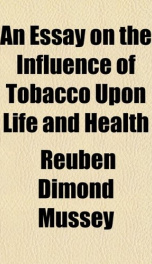An Essay on the Influence of Tobacco upon Life and Health

Purchase of this book includes free trial access to www.million-books.com where you can read more than a million books for free. This is an OCR edition with typos. Excerpt from book: ESSAY ON TOBACCO, In the great kingdom of living nature, man is the only animal that seeks to poison or destroy his own instincts, to turn topsy-turvy the laws of his being, and to make himself as unlike as possible that which he was obviously designed to be. No satisfactory solution of this extraordinary propensity has been given, short of a reference to that " first disobedience, and the fruit. Of that forbidden tree, whose mortal taste Brought death into the world and all our woe, With loss of Eden." While the myriads of sentient beings spread over the earth adhere with unyielding fidelity to the laws of their several existences, man exerts his superior intellect in attempting to outwit nature, and to show that she has made an important mistake in his own case. Not satisfied with the symmetry and elegance of form given him by his Creator, he transforms himself into a hideous monster, or copies uponhis own person the proportions of some disgusting creature far down in the scale of animal being. Not content with loving one thing and loathing another, ho perseveres in his attempts to make bitter sweet and sweet bitter, till nothing but the shadow is left of his primitive relishes and aversions. This is strikingly exemplified in the habitual use of the narcotic or poisonous vegetables. HISTOKY. Tobacco is generally regarded as having originated in America. Its name appears to have been derived from Tabaco, a province of Yucatan, in Mexico, from which place it is said to have been first sent to Spain; or, as some assert, though with less probability, from an instrument named Tabaco, employed in His- paniola in smoking this article. Cortez sent a specimen of it to the king of Spain in 1519. Sir Francis Drake is said to have introduced it into England about the y...
Info about the book
Author:
Series:
Unknown
ASIN:
B0082ZHZDU
Rating:
2.5/5 (3)Your rating:
0/5
Languge:
English
Users who have this book
Users who want this book
What readers are saying
What do you think? Write your own comment on this book!
write a commentif you like An Essay on the Influence of Tobacco upon Life and Health try:
Other books by this author
Do you want to exchange books? It’s EASY!
Get registered and find other users who want to give their favourite books to good hands!

